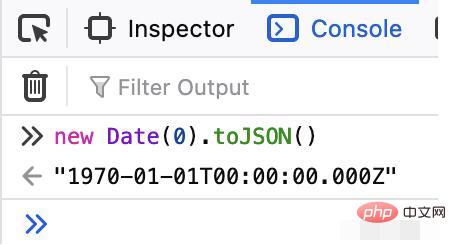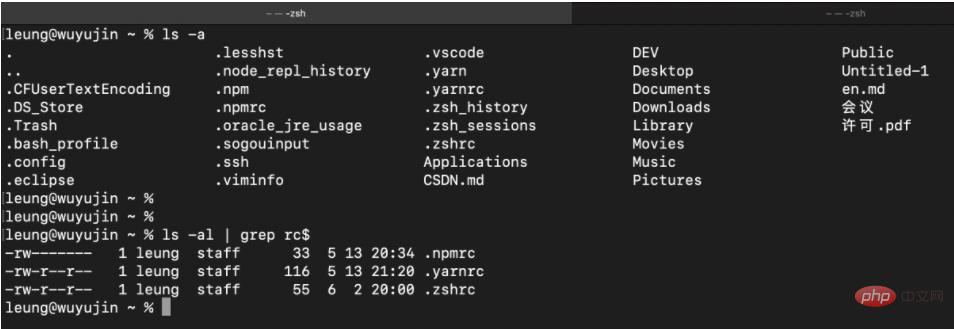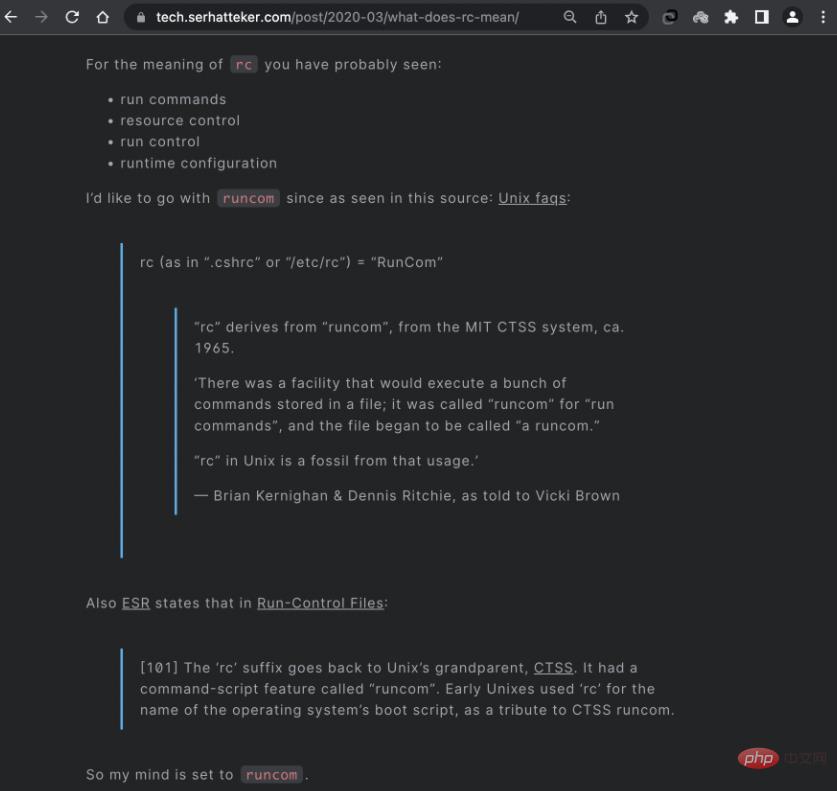Rumah >Operasi dan penyelenggaraan >operasi dan penyelenggaraan linux >Apakah maksud linux rc?
Apakah maksud linux rc?
- 藏色散人asal
- 2023-03-16 09:33:122706semak imbas
linux rc ialah singkatan runcom, dan juga rc yang muncul dalam ".cshrc" atau "/etc/rc" rc berasal daripada runcom, yang pertama kali muncul dalam sistem MIT CTSS pada tahun 1965; dalam sesetengah senario , akan melaksanakan berbilang arahan yang disimpan dalam fail, yang kami panggil runcom, yang merupakan singkatan daripada arahan run.

Persekitaran pengendalian tutorial ini: sistem linux5.9.8 , komputer Dell G3.
Apakah maksud linux rc?
Makna penuh Linux rc
Ini berasal dari zaman prasejarah Sistem Unix (1961 -1969), pada mulanya, MIT membangunkan Sistem Perkongsian Masa yang Serasi (CTSS).
(Walaupun fungsi CTSS ini tidak sebaik sistem Unix terkemudian, ia lebih lama dan lebih lama.)
Terdapat ciri tentang skrip arahan dalam sistem CTSS yang dipanggil runcom.
Untuk memberi penghormatan kepada ciri runcom CTSS, versi awal sistem Unix, rc telah digunakan sebagai nama fail permulaan sistem pengendalian dalam sistem Unix kemudiannya.
Petua
Tarikh dalam bahasa pengaturcaraan bermula dari 1970-01-01, 
Dan era prasejarah Unix yang disebut sebelum ini (1961-1969 ) sebelum 1970.
Anda juga boleh merasai "seniority" sistem CTSS dari sisi.
Maksud
rc = RunCom
"rc" diambil daripada "runcom", daripada MIT pada tahun 1965 Pembangunan sistem CTSS . Kesusasteraan yang berkaitan pernah merekodkan perenggan ini: "Ia mempunyai fungsi mengeluarkan satu siri arahan daripada fail untuk dilaksanakan; ini dipanggil run commands dan juga dipanggil "runcom", dan fail jenis ini juga dipanggil runcom ( a runcom)."
Instance
-
.bashrcbash running command -
.vimrcvim running command -
.npmrcDalam perintah menjalankan npm
dalam Linux, nama fail bermula dengan . diwakili sebagai fail tersembunyi.

leung@wuyujin ~ % ls -al | grep rc$ -rw------- 1 leung staff 33 5 13 20:34 .npmrc -rw-r--r-- 1 leung staff 116 5 13 21:20 .yarnrc -rw-r--r-- 1 leung staff 55 6 2 20:00 .zshrc
Rujukan Apakah maksud rc dalam bashr, zshrc, vimrc dll?
Apakah maksud rc dalam bashr, zshrc, vimrc dll?
diterjemahkan seperti berikut:
Untuk maksud rc, anda boleh melihat perkara berikut:
- jalankan arahan (jalankan arahan)
- kawalan sumber (kawalan sumber)
- kawalan jalankan (kawalan jalankan)
- konfigurasi masa jalan (konfigurasi masa jalan)
Selepas membaca dokumen ini, saya lebih suka berfikir bahawa rc ialah singkatan daripada runcom.
rc = RunCom ialah yang muncul dalam .cshrc atau /etc/rc rcrc berasal dari runcom, yang pertama kali muncul dalam sistem MIT CTSS pada tahun 1965.
Dalam sesetengah senario, (kami) akan melaksanakan berbilang perintah commands yang disimpan dalam fail, yang kami panggil runcom, yang merupakan singkatan daripada arahan run run commands.
Selain itu, fail yang digunakan untuk menyimpan arahan dipanggil: a runcom.
rc dalam penamaan fail Unix berasal dari kiasan lama ini.
— Brian Kernighan & Dennis Ritchie, seperti yang diberitahu kepada Vicki Brown
Juga ESR menyatakan bahawa dalam Run-Control Files:
>Run-Control Jika anda mengesan akhiran sepanjang jalan ke belakang, anda akan mendapati ia sebenarnya wujud dalam CTSS, datuk kepada sistem Unix.
Dalam sistem kuno CTSS, terdapat ciri skrip arahan yang dipanggil: rc.
Jadi pada zaman awal Unix, runcom telah digunakan sebagai nama fail skrip permulaan sistem pengendalian untuk memanggil semula/membayar penghormatan kepada CTSS runcom. rcJadi saya rasa:
. rcruncom
CTSS(Compatible Time-Sharing System)兼容分时系统
Unix系统的背景
1961-1969:史前时代
CTSS(Compatible Time-Sharing System,兼容分时系统),以MIT为首的开发小组,小而简单的实验室原型。
Multics(Multiplexed Information and Computing System,多路信息与计算系统),庞大而负责,不堪重负。
Unics(Uniplexed information and Computing System,单路信息与计算系统),返璞归真,走上正道。
1969-1971:创世纪
……
参考 Unix - Frequently Asked Questions (1/7) [Frequent posting]Section - What does {some strange unix command name} stand for
1.3) What does {some strange unix command name} stand for?
awk = "Aho Weinberger and Kernighan"
This language was named by its authors, Al Aho, Peter
Weinberger and Brian Kernighan.
grep = "Global Regular Expression Print"
grep comes from the ed command to print all lines matching a
certain pattern
g/re/p
where "re" is a "regular expression".
fgrep = "Fixed GREP".
fgrep searches for fixed strings only. The "f" does not stand
for "fast" - in fact, "fgrep foobar *.c" is usually slower than
"egrep foobar *.c" (Yes, this is kind of surprising. Try it.)
Fgrep still has its uses though, and may be useful when searching
a file for a larger number of strings than egrep can handle.
egrep = "Extended GREP"
egrep uses fancier regular expressions than grep. Many people
use egrep all the time, since it has some more sophisticated
internal algorithms than grep or fgrep, and is usually the
fastest of the three programs.
cat = "CATenate"
catenate is an obscure word meaning "to connect in a series",
which is what the "cat" command does to one or more files. Not
to be confused with C/A/T, the Computer Aided Typesetter.
gecos = "General Electric Comprehensive Operating Supervisor"
When GE's large systems division was sold to Honeywell,
Honeywell dropped the "E" from "GECOS".
Unix's password file has a "pw_gecos" field. The name is a
real holdover from the early days. Dennis Ritchie has reported:
"Sometimes we sent printer output or batch jobs
to the GCOS machine. The gcos field in the password file
was a place to stash the information for the $IDENT card.
Not elegant."
nroff = "New ROFF"
troff = "Typesetter new ROFF"
These are descendants of "roff", which was a re-implementation
of the Multics "runoff" program (a program that you'd use to
"run off" a good copy of a document).
tee = T
From plumbing terminology for a T-shaped pipe splitter.
bss = "Block Started by Symbol"
Dennis Ritchie says:
Actually the acronym (in the sense we took it up; it may
have other credible etymologies) is "Block Started by
Symbol." It was a pseudo-op in FAP (Fortran Assembly [-er?]
Program), an assembler for the IBM 704-709-7090-7094
machines. It defined its label and set aside space for a
given number of words. There was another pseudo-op, BES,
"Block Ended by Symbol" that did the same except that the
label was defined by the last assigned word + 1. (On these
machines Fortran arrays were stored backwards in storage
and were 1-origin.)
The usage is reasonably appropriate, because just as with
standard Unix loaders, the space assigned didn't have to be
punched literally into the object deck but was represented
by a count somewhere.
biff = "BIFF"
This command, which turns on asynchronous mail notification,
was actually named after a dog at Berkeley.
I can confirm the origin of biff, if you're interested.
Biff was Heidi Stettner's dog, back when Heidi (and I, and
Bill Joy) were all grad students at U.C. Berkeley and the
early versions of BSD were being developed. Biff was
popular among the residents of Evans Hall, and was known
for barking at the mailman, hence the name of the command.
Confirmation courtesy of Eric Cooper, Carnegie Mellon University
rc (as in ".cshrc" or "/etc/rc") = "RunCom"
"rc" derives from "runcom", from the MIT CTSS system, ca. 1965.
'There was a facility that would execute a bunch of
commands stored in a file; it was called "runcom" for "run
commands", and the file began to be called "a runcom."
"rc" in Unix is a fossil from that usage.'
Brian Kernighan & Dennis Ritchie, as told to Vicki Brown
"rc" is also the name of the shell from the new Plan 9
operating system.
Perl = "Practical Extraction and Report Language"
Perl = "Pathologically Eclectic Rubbish Lister"
The Perl language is Larry Wall's highly popular
freely-available completely portable text, process, and file
manipulation tool that bridges the gap between shell and C
programming (or between doing it on the command line and
pulling your hair out). For further information, see the
Usenet newsgroup comp.lang.perl.misc.
Don Libes' book "Life with Unix" contains lots more of these
tidbits.
相关推荐:《Linux视频教程》
Atas ialah kandungan terperinci Apakah maksud linux rc?. Untuk maklumat lanjut, sila ikut artikel berkaitan lain di laman web China PHP!

